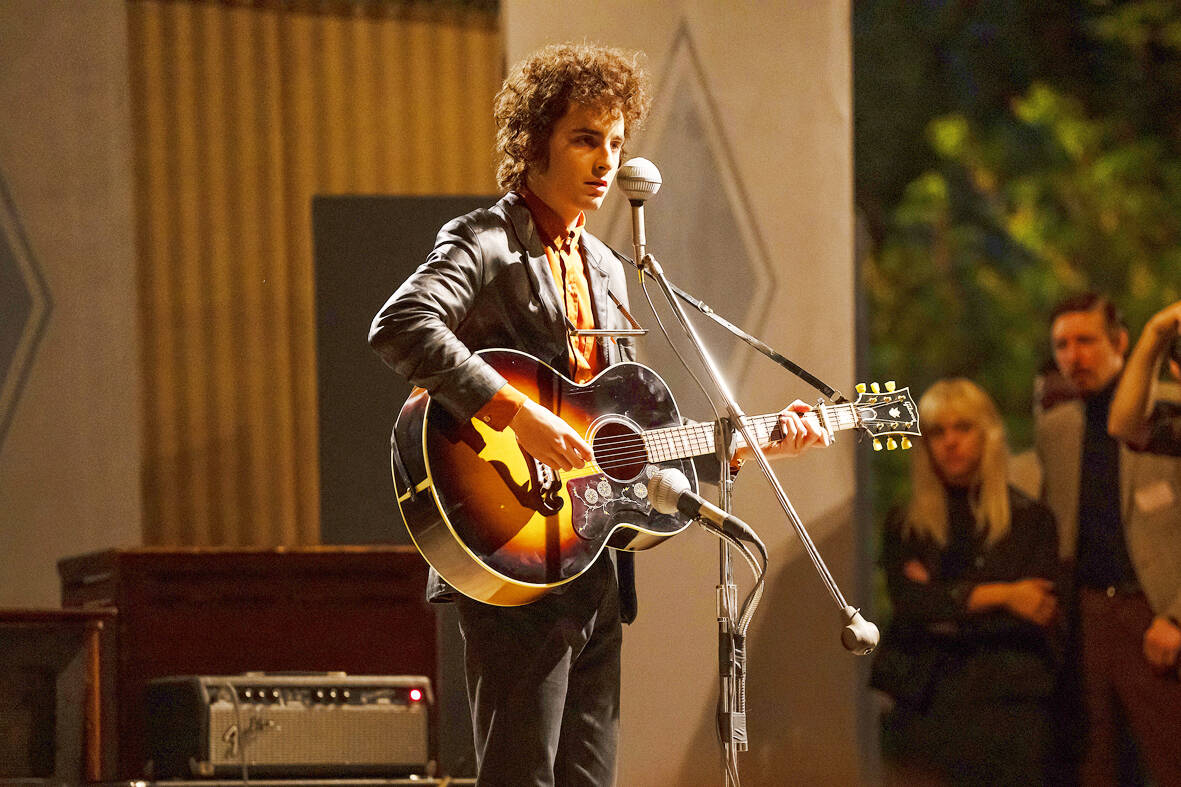It’s a remarkable performance. Star of the moment Timothee Chalamet inhabits the loose-limbed, live-wire physicality of the young Bob Dylan and makes an impressively good fist of capturing the frayed hessian of his distinctive voice. Acoustic guitars are plucked and harmonicas honked with the effortless fluency of someone who learned to play almost before they could walk.
Chalamet’s Dylan sucks so fervently on his cigarettes it’s as though he’s breathing in the genius of the musical heroes who came before him. But while he radiates insouciant charisma and channels the once-in-a-lifetime talent, he reveals next to nothing about Dylan as a person. This is not necessarily a failure in Chalamet’s acting. It’s a deliberate choice — the film, which is in Taiwan theaters, is called A Complete Unknown, after all, and it’s a manifesto as much as a title. But it does mean that this is more a movie about Dylan the phenomenon than Dylan the man; a picture that peers at the folk legend through the distorting lens of fame and fan worship.
As such, there’s a curious kinship between this handsome if formulaic period piece by music movie veteran James Mangold (he also directed the Johnny Cash portrait Walk the Line) and Michael Gracey’s recent Robbie Williams-as-monkey biopic, Better Man.

Photo: AP
Gracey’s film and A Complete Unknown both explore the impact of sudden and stratospheric celebrity on very young artists. Like Williams, Dylan is shown as a fully formed talent but a half-grown man. But while Williams mainlines fame like a drug and then bares his damaged soul to all, Dylan builds barricades against the encroaching tide of celebrity and protects himself with layers of assumed identities — an idea previously explored by Todd Haynes’s formally daring but frequently infuriating 2007 Dylan film I’m Not There.
The sunglasses, the Triumph motorbike, the studied disinterest, the sneer — it’s all, A Complete Unknown suggests, part of the wall that Dylan constructs to protect the vulnerable part of himself, if indeed it exists.
In one of several clearly signposted dialogue exchanges early in the film, Bob and his girlfriend Sylvie Russo (Elle Fanning in a role based on Dylan’s actual partner at the time, Suze Rotolo) discuss Now, Voyager, the Bette Davis-starring melodrama about the central character’s reinvention.

Photo: AP
“She just made herself into something different… what she wanted to be in that moment,” muses Dylan, who has already rewritten his own origin story to include a stint in a traveling carnival.
You can practically see the cogs turning under his unruly mop of hair. Shortly after this, Sylvie, who is due to go and study in Europe for a few months, gets to deliver another very on-the-nose line that sums up this particular aspect of the story: “I’m going to miss you,” she says, but then adds: “I realize I don’t know you.”
Mangold’s film is based on Elijah Wald’s 2015 book Dylan Goes Electric! (which culminates in an explosive extended sequence at the 1965 Newport folk festival) and makes Dylan’s rejection of traditional folk in favor of rock and blues-inspired electric guitars another one of its central themes.
This is foreshadowed in an equally heavy-handed manner. Pete Seeger (Edward Norton, beaming benevolently over his banjo), a folk elder statesman and de facto father figure for Dylan, interrogates the young troubadour about his musical allegiances: folk or rock. You can choose only one. These extremely pointed conversational markers can be a little jarring, undermining the film’s considerable strengths elsewhere.
Those strengths include the vividly evoked sense of a time and milieu (the burgeoning downtown New York folk scene of the early 1960s). It’s a world thick with pipe smoke and poetry readings, ripe with possibilities — a neat counterpoint to the Coen brothers’ depiction, in Inside Llewyn Davis, of a Greenwich Village paved with petty disappointments and humiliations.
Meanwhile, hit after hummable hit, the soundtrack is a tribute to Dylan’s incredible creativity during this period of his career, and the impact the songs had on his audiences.
There are moments when Mangold lays it on a little thick. Having slept on the Seeger family’s sofa, the young Bob noodles around on his guitar the next morning, playing a song that will eventually become Girl from the North Country. Pete stands, mouth agape and toothbrush at half-mast, transported by the genius that he’s witnessing.
What A Complete Unknown shows brilliantly, however, is the way that music in the right hands becomes a weapon. The galvanizing power of The Times They Are a-Changin’, debuting before a crowd that spontaneously joins in with the chorus, is thrilling. Better still are the sweetly savage harmonies between Dylan and his former lover Joan Baez (Monica Barbaro, whose note-perfect performance is the film’s secret ingredient) as they trade the lines of It Ain’t Me Babe like bitter recriminations.

Three big changes have transformed the landscape of Taiwan’s local patronage factions: Increasing Democratic Progressive Party (DPP) involvement, rising new factions and the Chinese Nationalist Party’s (KMT) significantly weakened control. GREEN FACTIONS It is said that “south of the Zhuoshui River (濁水溪), there is no blue-green divide,” meaning that from Yunlin County south there is no difference between KMT and DPP politicians. This is not always true, but there is more than a grain of truth to it. Traditionally, DPP factions are viewed as national entities, with their primary function to secure plum positions in the party and government. This is not unusual

Mongolian influencer Anudari Daarya looks effortlessly glamorous and carefree in her social media posts — but the classically trained pianist’s road to acceptance as a transgender artist has been anything but easy. She is one of a growing number of Mongolian LGBTQ youth challenging stereotypes and fighting for acceptance through media representation in the socially conservative country. LGBTQ Mongolians often hide their identities from their employers and colleagues for fear of discrimination, with a survey by the non-profit LGBT Centre Mongolia showing that only 20 percent of people felt comfortable coming out at work. Daarya, 25, said she has faced discrimination since she

More than 75 years after the publication of Nineteen Eighty-Four, the Orwellian phrase “Big Brother is watching you” has become so familiar to most of the Taiwanese public that even those who haven’t read the novel recognize it. That phrase has now been given a new look by amateur translator Tsiu Ing-sing (周盈成), who recently completed the first full Taiwanese translation of George Orwell’s dystopian classic. Tsiu — who completed the nearly 160,000-word project in his spare time over four years — said his goal was to “prove it possible” that foreign literature could be rendered in Taiwanese. The translation is part of

April 21 to April 27 Hsieh Er’s (謝娥) political fortunes were rising fast after she got out of jail and joined the Chinese Nationalist Party (KMT) in December 1945. Not only did she hold key positions in various committees, she was elected the only woman on the Taipei City Council and headed to Nanjing in 1946 as the sole Taiwanese female representative to the National Constituent Assembly. With the support of first lady Soong May-ling (宋美齡), she started the Taipei Women’s Association and Taiwan Provincial Women’s Association, where she